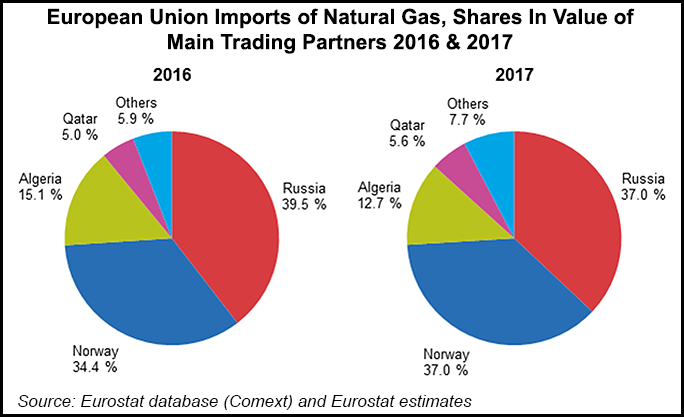E&P | Infrastructure | NGI All News Access | NGI The Weekly Gas Market Report
BP-Led Shah Deniz 2 Natural Gas Behemoth Starts Up in Caspian Sea
The BP plc-operated Shah Deniz consortium has launched its landmark natural gas development in Azerbaijan, laying the groundwork for Europe to avoid dependence on Russian gas.

The $28 billion project is the first subsea development in the Caspian Sea and the largest subsea infrastructure operated by BP worldwide. The development also is the starting point for the Southern Gas Corridor series of pipelines to deliver gas directly to European markets.
“Shah Deniz 2 is one of the biggest and most complex new energy projects anywhere in the world, comprising major offshore, onshore and pipeline developments,” BP Group CEO Bob Dudley said. “BP and our partners have safely and successfully delivered this multi-dimensional project as designed, on time and on budget.”
Shah Deniz 2 is BP’s second major startup this year, following the Atoll project in Egypt during March, with four more planned by the end of 2018.
The first phase of field development, Shah Deniz 1, began production in 2006 and supplies gas to Azerbaijan, Georgia and Turkey. Shah Deniz 2 was sanctioned in 2013.
At plateau, Shah Deniz 2 is expected to produce 565 Bcf/year (16 bcm/year) incrementally to current production. Together with output from the first phase of development, total production is forecast to be as high as 918 Bcf/year (26 bcm/year) with up to 120,000 b/d of condensate.
Shah Deniz 2 includes 26 subsea wells, 500 kilometers (311 miles) of subsea pipelines and flowlines and two new bridge-linked platforms. Gas is transported onshore from the Caspian via a 85-kilometer (53-mile) pipeline to the Sangachal terminal near Baku, which underwent a major expansion to accommodate the increased output.
The project also includes the South Caucasus pipeline expansion, 428 kilometers (266 miles) of pipeline in Azerbaijan and 59 kilometers (37 miles) in Georgia, including two compressor stations carrying gas to Turkey.
“Bringing this huge project online within the schedule and budget we set out at sanction four and a half years ago is further evidence of our focus on efficient and disciplined project execution,” said BP’s upstream CEO, Bernard Looney. “As our largest start-up for the year, Shah Deniz 2 is also a very important milestone in delivering our plans for growth, including from our pipeline of new higher-margin projects.”
BP expects to operate in Azerbaijan “for decades to come, and we continue to see opportunities to work with the country to further explore and develop its significant resources.”
The development is a major milestone in creating the Southern Gas Corridor which, once completed, would carry Caspian gas directly into the heart of European markets for the first time. When completed, the Southern Gas Corridor in total is to comprise 3,500 kilometers (2,175 miles) of pipelines.
From the South Caucasus pipeline, gas is to be transported across Turkey through the Trans-Anatolian Pipeline (TANAP), which was inaugurated in June. When complete, the Trans-Adriatic Pipeline (TAP) then would carry the gas as far as Greece, Albania and Italy. Commercial deliveries to Europe are expected to begin in 2020.
Shah Deniz is the largest gas discovery ever made by BP. Discovered in 1999, the giant field was estimated to hold about 1 tcm (35 Tcf) and covers around 860 square kilometers (534 square miles), roughly the same size and shape of New York City’s Manhattan Island.
BP operates and has a 28.8% stake in the project with Turkey’s TPAO, 19%; Malaysia’s Petroliam Nasional Berhadetronas, aka Petronas, 15.5%; Azerbaijan’s AzSD, 10.0%; SGC Upstream, 6.7%; Russia’s state-owned Lukoil, 10%; and Iran’s Nico, 10%.
At peak, BP said the Shah Deniz 2 development supported more than 30,000 jobs in Azerbaijan and Georgia and in total included more than 180 million hours of work.
© 2024 Natural Gas Intelligence. All rights reserved.
ISSN © 1532-1231 | ISSN © 2577-9877 | ISSN © 1532-1266 |
